Contents
The Silent Garden
Praise for The Silent Garden
I dont often come across a resource that thoughtfully looks at the decisions families must make and the complexities of raising a child who is Deaf/Hard of Hearing. I would recommend this book to all families who are beginning their journey.
Janet DesGeorges,
Executive Director, Hands & Voices
I will share this insightful book with new parents knowing that this is a publication that speaks to their hearts and souls in a powerful and truthful manner.
Gerard Buckley, President,
National Technical Institute for the Deaf
Ogden and Smith empower readers, parents and professionals alike, with a treasure trove of ready-to-use tools and copious amounts of information to support the decision-making process.
Jennifer Blohm, Early Intervention Deaf
and Hard-of-Hearing Specialist
This invaluable book cuts through emotional issues, identifies subconscious struggles, and demonstrates successful pathways for living with deafness.
Glenda Lane, Parent
As a Deaf individual raising a Deaf daughter, this book affirmed for me the importance of following the childs lead in what is best for his/her cognitive, social, and language development.
Michelle L. Bronson,
Parent and Executive Director,
Deaf and Hard of Hearing Service Center, Inc.
The Silent Garden was a valuable resource for my Deaf/Hard of Hearing students and their parents. This wonderful, informative book gives unbiased information and guidance to newly identified Deaf children and their families. Parents often shared that the book spoke to them like a good friend.
Rosie Ruelas-Wasser, Educator
The Silent
Garden
A Parents Guide to
Raising a Deaf Child
Paul W. Ogden
David H. Smith
Gallaudet University Press / Washington, DC
Gallaudet University Press
Washington, DC 20002
http://gupress.gallaudet.edu
2016 by Paul W. Ogden and David H. Smith
All rights reserved. Published 2016
Printed in the United States of America
Library of Congress Cataloging-in-Publication Data
Names: Ogden, Paul W., author.
Title: The silent garden : a parents guide to raising a deaf child / Paul W. Ogden, David H. Smith ; foreword by Marlee Matlin.
Description: Third Edition. | Washington, DC : Gallaudet University Press, 2016. | Revised edition of The silent garden, 1996.
Identifiers: LCCN 2016026123| ISBN 9781563686764 (paperback) | ISBN 9781563686771 (ebook)
Subjects: LCSH: Deaf childrenFamily relationships. | Deaf childrenEducation. | BISAC: FAMILY & RELATIONSHIPS / Parenting / General.
Classification: LCC HV2392.2 .O34 2016 | DDC 649/.1512dc23
LC record available at https://lccn.loc.gov/2016026123
 This paper meets the requirements of ANSI/NISO Z39.48-1992
This paper meets the requirements of ANSI/NISO Z39.48-1992
(Permanence of Paper).
Digital painting of the Silent Garden by Tracey Salaway, 2016.
This book is dedicated to Harry and Jean Smith, Davids parents.
They expected nothing less than great achievements from their son in response to naysayers and skeptics.
Dedication from the second edition:
This book is dedicated to Dunbar H. Ogden and Annegret S. Ogden, my brother, sister-in- law, and close friends. They refused to be my ears. Instead they taught me to read the world.
Dedication from the first edition:
This book is dedicated to Dorothy C. Ogden, Pauls very special mother, who cherishes the following poem:
Heavens Very Special Child
A meeting was held quite far from earth!
Its time for another birth.
Said the angels to the LORD above,
This Special Child will need much love.
His progress may be very slow,
Accomplishments it may not show,
And itll require extra care
From the folks it meets down there.
So lets be careful where its sent;
We want its life to be content;
Please LORD, find the parents and teachers who
Will do a special job for you,
They will not realize right away
The leading role theyre asked to play,
But with this child sent from above
Comes stronger faith and richer love.
And soon theyll know the privilege given
In caring for this gift from Heaven;
Their precious charge, so meek and mild,
Is Heavens Very Special Child.
by Edna Massionilla
Contents
Foreword
Marlee Matlin
W HEN I SEE and meet deaf children and their families, I often observe how they interact together, and I especially note how, or even if, communication is happening. Does it seem to be happening naturally and spontaneously? Is there a bit of a struggle, but the parents are making a good effort to help their child understand? Or is there very little communication happening at all? The first two situations are always good to see; however, when little or no communication is taking place, I see a tragedy happening before my eyes, because a deaf child is being deprived of the chance to learn language. I doubt it is because the parents dont care. Most parents love their children. Perhaps it may be because the parents have no idea how or what to do. If you are a parent who wishes to know the how and what and wants the best for their deaf child, you have come to the right place: the Silent Garden. It is actually a very vibrant and colorful place, with much going on to see and enjoy. This is the kind of place where all deaf children and their families will thrive and grow together.
It is rare to find an academic who is committed to writing for everyday folks rather than exclusively for scholars and professionals. It is even more rare to find deaf academics, but thanks to improvements in communication access over the years, their ranks are growing. Two of them who you will meet here, authors Paul Ogden and Dave Smith, have stated that their philosophy is to get information to the people who need it the mostthe parents of deaf and hard of hearing children. Four characteristics make this book a radical departure from other works in the field of deaf education. The authors both are deaf, whereas most literature on parenting is written by hearing professionals; they use their personal experiences and understanding of being deaf as their reference point in discussing the special needs and problems of deaf children from birth to age twenty one; they include findings from interviews with more than 350 parents of deaf children as well as discussions with at least 500 deaf adults as an additional reservoir of experience from which to draw; and the books overall purpose is to channel the knowledge and expertise available to academics and professionals to nonacademic audiences and primarily parents. This information may often be lost along the way due to the technical language in which it is often presented, in addition to the stress of the moment that parents are experiencing. What is needed is straightforward guidance in resolving the inevitable issues that come up and in making the necessary decisions. The authors have provided it here.
Dr. Ogden and Dr. Smith proceed with the understanding that a deaf child is not merely a deaf person, but a complete and complex human being who happens to be deaf. The distinction is subtle but important. Historically, deaf children have been treated as having deficiencies merely because they cannot hear or speak well. Often, they have poor literacy outcomes as part of a self-fulfilling prophecy with low expectations for achievement. But the authors make it clear that children who are deaf, when provided full access to communication and taught to partake of the full range of human experience, have the potential to lead productive and ultimately independent lives. The authors themselves are a living testimony to the kind of potential that deaf individuals can reach, given good parenting and a good education. Dr. Ogden, although retired from California State University, Fresno, with the honored title of professor emeritus, is still active in promoting effective practices in raising and educating deaf children. He still travels to meet with parents and their children throughout the United States, a rare venture for an academic. Dr. Smith is the director of the Center on Deafness at the University of Tennessee in Knoxville. Dr. Ogden and Dr. Smiths work strikes an ideal balance of achievement, between teaching students and writing for and working with parents and professionals in the language each is comfortable using.

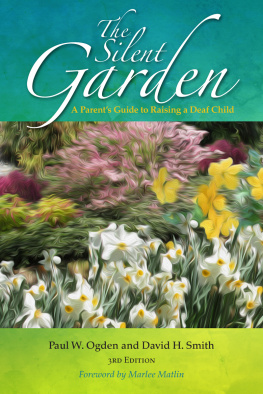

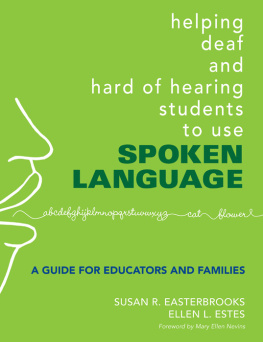
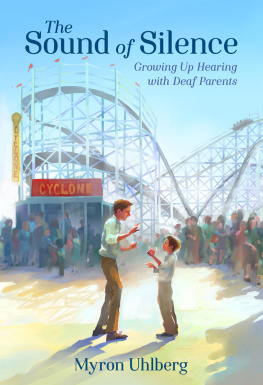
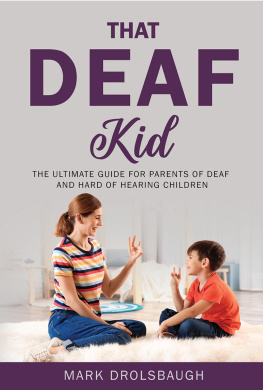
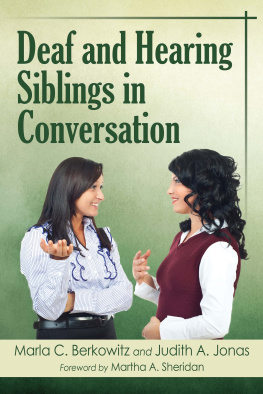
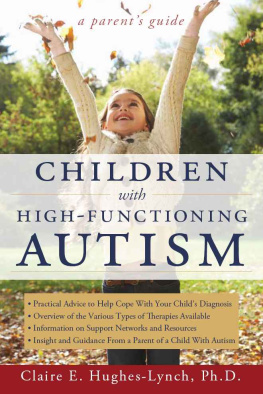

 This paper meets the requirements of ANSI/NISO Z39.48-1992
This paper meets the requirements of ANSI/NISO Z39.48-1992